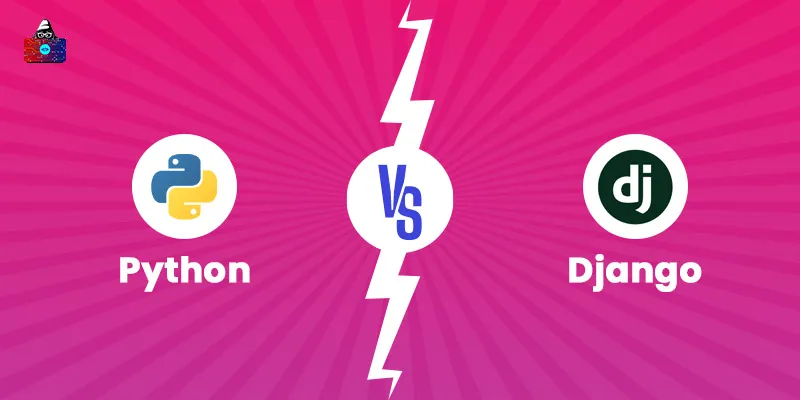Python vs Django is incomparable as the former is a programming language while the latter is a web framework. However, many still ask, ‘How is Python different from Django?’.
If you have experience working with Python and you don’t know what Django is, it’s completely okay. Django is not something that every Python developer should be familiar with. However, if you are learning Python for web development, Django becomes important as it is one of the most popular Python web development frameworks .
Python is a high-level language, and it is among the most popular languages today, all thanks to its versatile nature. It is used in various fields, such as scientific research, web development, artificial intelligence development, data analysis, and software development.
When we talk about web development using Python, we need some special tools called web frameworks to speed up the web development process. Django is the most famous web framework for Python out there.
It is irrelevant to differentiate Python from Django. Django is an application of Python. The only difference between Django and Python is that Python is a programming language and Django is a Python web framework.
Python vs Django: Overview, Features, Advantages, Disadvantages
In this section, we will briefly introduce Python and Django along with their features, advantages, and disadvantages.
Python
Python is a high-level, interpreted language created by Guido van Rossum, and it was first released in 1991. It is a multi-paradigm programming language that works on object-oriented programming . The syntax of Python plays an important role in differentiating it from other high-level programming languages. The simplicity of the Python syntax makes it quite easy to learn and understand. The future of Python is very bright as compared to other programming languages.
Features
- Python is a dynamically-typed language.
- It supports object-oriented programming.
- It is also a high-level and functional imperative programming language.
Advantages of Python
- Easy to read and understand.
- You don’t need to declare the variable type while writing the code.
- Support object-oriented as well as procedure-oriented programming.
- It can be extended to other languages like C or C++ .
- Python code written on one platform can run on other platforms without any changes. You can run the Python code written in Windows on another system with macOS without making any changes.
- macOS already supports Python; you do not need to install Python separately.
- Python is open-source and free to use.
- The community of Python developers is quite large.
- It supports a large number of standard libraries.
- It has its own web frameworks.
Disadvantages of Python
- Python is slow compared to other programming languages, such as C++ or Java.
- It is not an ideal choice for developing apps for smartphones.
- Python is a dynamic language, so the user does not need to declare the variable type while writing the code. This may lead to errors, especially when programmers mistake one data type.
- The database access of Python is yet underdeveloped.
Python Applications
- Python offers many web development frameworks, such as Django, Pyramid, etc., allowing developers to build robust websites and web apps.
- It is widely used in scientific and numeric computing.
- Python can be used to develop an operating system .
- Help in designing GUI-based desktop applications.
Django
Django is one of the most popular web frameworks of Python. A web framework is designed to support the development of dynamic web applications.
Features
- It is quite fast.
- It contains many useful components.
- Django is highly secure.
- It has a versatile nature.
Advantages of Django
- Django supports Object-Relation Mapper, and you can define your data models.
- As it is written in Python, it is very easy to learn.
- It has a vast community that is spread across the world.
- It is used to manage the user content of the website, whether you want to add a user or create a group.
- Django has a full-fledged authentication system that can handle user accounts, passwords, and cookies.
Disadvantages of Django
- The routing pattern specifies its URL.
- Django is excessively Monolithic; it directs the developer to write into the given pattern instead of using a free programming structure.
- It does not have the capacity to manage multi requests.
Python vs Django: A Head-to-Head Comparison
| Key Points | Python | Django |
| Released | 1991 | 2005 |
| Developers | Python Software Foundation | Django Software Foundation |
| Filename | .py, .pyc, .pyd, .pyo | .py, .pyc, .pyd, .pyo |
| Type | Programming Language | Web Framework |
| Applications | Web development, data analysis, A.I., software development, etc. | Web Application |
| Written in | C | Python |
| Open-source | Yes | Yes |
| Official Website | www.python.org | www.djangoproject.com |
Conclusion
To conclude the Python vs Django topic, we can say that Python and Django are significantly different. Python is a general-purpose, high-level programming language with applications in several fields, including web development, game development, artificial intelligence , machine learning , and data science . On the contrary, Django is a Python web framework that facilitates the development of websites and web apps.
People are also reading:





Leave a Comment on this Post